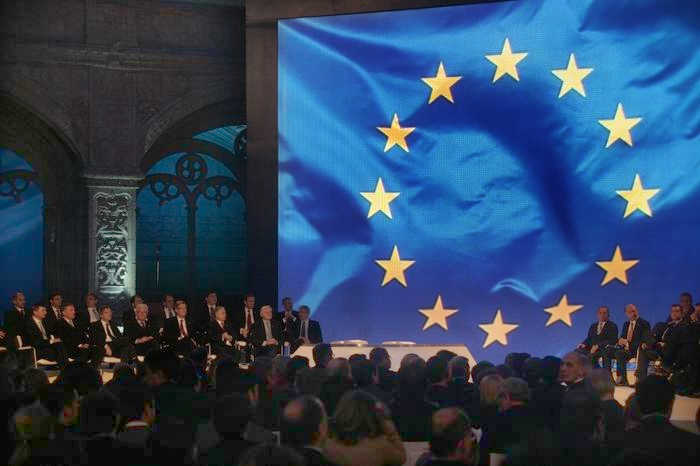Treaty of Lisbon is signed by members states of European Union
The Treaty of Lisbon (initially known as the Reform Treaty) is an international agreement that amends the two treaties which form the constitutional basis of the European Union (EU). The Treaty of Lisbon was signed by the EU member states on 13 December 2007, and entered into force on 1 December 2009. It amends the Maastricht Treaty (1992), known in updated form as the Treaty on European Union (2007) or TEU, and the Treaty of Rome (1957), known in updated form as the Treaty on the Functioning of the European Union (2007) or TFEU. It also amends the attached treaty protocols as well as the Treaty establishing the European Atomic Energy Community (EURATOM).
Prominent changes included the move from unanimity to qualified majority voting in at least 45 policy areas in the Council of Ministers, a change in calculating such a majority to a new double majority, a more powerful European Parliament forming a bicameral legislature alongside the Council of Ministers under the ordinary legislative procedure, a consolidated legal personality for the EU and the creation of a long-term President of the European Council and a High Representative of the Union for Foreign Affairs and Security Policy. The Treaty also made the Union's bill of rights, the Charter of Fundamental Rights, legally binding. The Treaty for the first time gave member states the explicit legal right to leave the EU, and established a procedure by which to do so.
The stated aim of the treaty was to "complete the process started by the Treaty of Amsterdam [1997] and by the Treaty of Nice [2001] with a view to enhancing the efficiency and democratic legitimacy of the Union and to improving the coherence of its action". Opponents of the Treaty of Lisbon, such as former Danish Member of the European Parliament (MEP) Jens-Peter Bonde, argued that it would centralize the EU, and weaken democracy by "moving power away" from national electorates. Supporters argue that it brings more checks and balances into the EU system, with stronger powers for the European Parliament and a new role for national parliaments.
Negotiations to modify EU institutions began in 2001, resulting first in the Treaty establishing a Constitution for Europe, which would have repealed the existing European treaties and replaced them with a "constitution". Although ratified by a majority of member states, this was abandoned after being rejected by 55% of French voters on 29 May 2005 and then by 61% of Dutch voters on 1 June 2005. After a "period of reflection", member states agreed instead to maintain the existing treaties, but to amend them, salvaging a number of the reforms that had been envisaged in the constitution. An amending "reform" treaty was drawn up and signed in Lisbon in 2007. It was originally intended to have been ratified by all member states by the end of 2008. This timetable failed, primarily due to the initial rejection of the Treaty in June 2008 by the Irish electorate, a decision which was reversed in a second referendum in October 2009 after Ireland secured a number of concessions related to the treaty.















0 comments
Sign in or create a free account